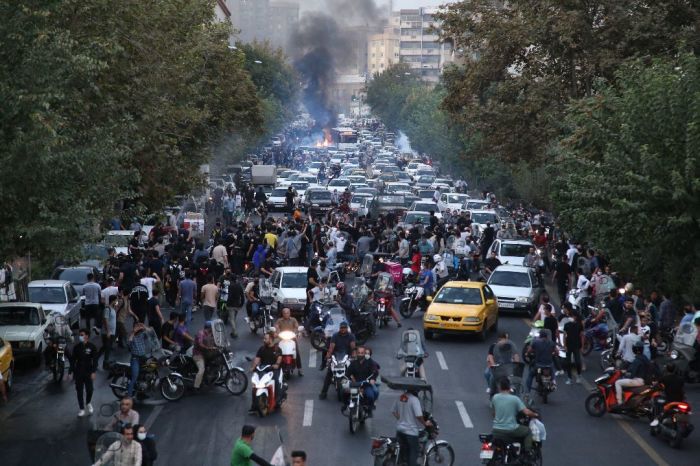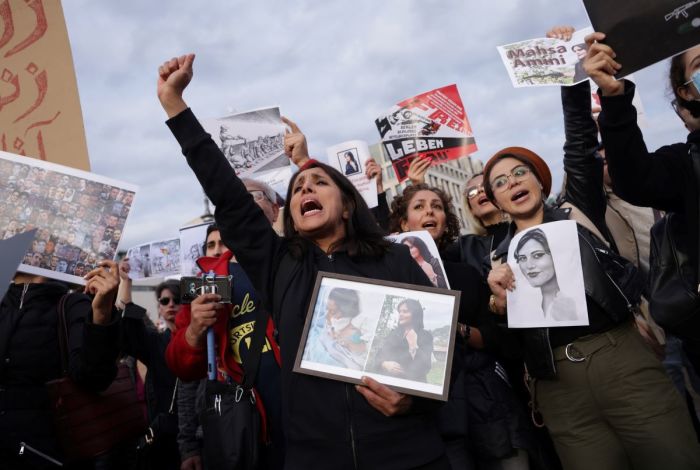Over 40 killed as mass protests rock Iran after ‘morality police’ kill woman over ‘improper hijab’

More than 40 people have reportedly been killed as anti-government protests rocked dozens of Iranian cities in the last week following the death of Mahsa Amini, a young woman arrested by the Iranian "morality police" for not properly wearing a hijab earlier this month.
At least 41 people have been killed, and more than 1,200 have been arrested during the protests as of Saturday, Iran's state television reports. According to Reuters, the death toll is unofficial as an official count has not been released.
The unrest followed the death Amini, a 22-year-old Kurdish woman who is said to have fallen into a coma in police custody after her arrest for not following Iran's strict conservative dress codes.
Amini was interrogated at the Vozara detention center, where she reportedly experienced blows to the head while under interrogation. Authorities claim she died of natural causes, but critics are skeptical.
Acting United Nations High Commissioner for Human Rights Nada Al-Nashif called for an impartial investigation by an "independent competent authority, that ensures, in particular, that her family has access to justice and truth."
The U.N. reports that Amini's death comes as morality police have expanded street patrols in recent months, "subjecting women perceived to be wearing 'loose hijab' to verbal and physical harassment and arrest." The U.N. Human Rights Office has received numerous verified videos of violent treatment of women, including women being beaten with batons and thrown into police vans.
In protest, women worldwide have burned headscarves and cut their hair.

In Iran, CNBC reports that crowds called for the fall of Iran's Supreme Leader Ayatollah Ali Khamenei and shouted: "death to the dictator."
State-organized rallies to counter anti-government protests were also held in several Iranian cities, calling for the execution of "rioters" who were portrayed as "Israel's soldiers," according to Reuters.
"Offenders of the Koran must be executed," the marchers chanted.
According to Reuters, some demonstrators have torched police stations and vehicles.
Iran's President Ebrahim Raisi, who addressed the U.N. General Assembly last week, said the government would "deal decisively with those who oppose the country's security and tranquillity," calling the unrest "a riot."
Iran's Chief of Police Hossein Ashtari also warned protesters, telling state television that people "involved in sabotage and creating insecurity based on directives from outside the country should know that they will be strongly dealt with."
The Islamic Republic's morality police, known as Gasht-e Ershad or "Guidance Patrol," is part of the country's law enforcement and enforces respect for Islamic morals as described by clerical authorities.
Even in Iran, prominent politicians are calling for an investigation into the police unit.
"In order to prevent repetition of such cases, the processes and the method of implementation in guidance patrols ... should be investigated," CBS News quoted Parliament Speaker Mohammad Bagher Ghalibaf as saying.
The U.S. Commission on International Religious Freedom, the bipartisan body tasked with advising the U.S. federal government and Congress on religious freedom issues, condemned Amini's death and the use of force on protesters.
"Mahsa Amini's horrific death is a culmination of months of violent Iranian government repression of women on the basis of religion," said USCIRF Commissioner Sharon Kleinbaum. "Those responsible for her death must be held accountable. Furthermore, we urge President [Joe] Biden to unreservedly condemn Iran for its violent and systematic attacks on women like Ms. Amini for wearing an 'improper hijab,' and other egregious violations of religious freedom, in his upcoming U.N. General Assembly speech."
USCIRF noted that Iran's government has mandated that women wear a hijab since 1979, citing its interpretation of religious conceptions of modesty as grounds to legally force women to cover their hair in public.
"In late 2021, Iran's government produced a policy document detailing plans to more strictly enforce these rules against women deemed to be covering their hair in an improper manner," USCIRF added. "In July 2022, security forces announced the beginning of these crackdowns, during which authorities harassed, shoved into vans, arrested, and tortured under interrogation scores of women."
In the last week, solidarity protests were held in several major international cities, including Athens, Berlin, Brussels, Los Angeles, New York, Paris, Stockholm Toronto, Vancouver and Washington.
The nationwide protests in Iran are the largest in Iran since the 2019 "Green Movement," an anti-government uprising in which 1,500 people were reportedly killed in a crackdown, according to Reuters.
But this time, "the protesters are much bolder," Evan Siegel, an expert on Iranian history, told CNBC. "Driven by their fury of decades of repression and humiliation, they have held their own in street fighting with the repressive organs, particularly the hated para-police."
He added that protests over the regime's "medieval attitudes" towards women are taking place, perhaps, for the first time.
Iran, a Shia country, is ranked the ninth worst country when it comes to Christian persecution, according to Open Doors USA's World Watch List.




























